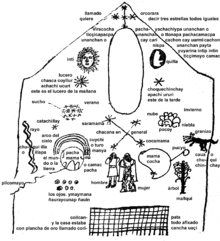Mother Nature, sometimes referred to as Mother
Earth, has roots dating back to 12 and 13 BC in Mycenaean Greek, ma-ka which
translates to ma-ga or Mother Gaia. Mother Nature is the
personification of nature, focusing on the life-giving aspects of a mother.
In Greek Mythology, 900-800 BC, Mother Nature
was the goddess of harvest, Demeter. We didn't have the seasons then as
we do now until her daughter, Persephone, was taken by the god of the dead,
Hades, to be his queen. It is then that Demeter became so distraught that
no crops would grow. The entire human race would have perished during
that time if Zeus had not stepped in and forced Hades to return Persephone.
Demeter's grief is reflected in the barren months of winter and her
happiness for Persephone's return is reflected in the warm summer months
in which we grow our produce.
During medieval Christian times, 5th to 15th
centuries, it was believed that God created Mother Nature. He granted
her the space below the heavens and moon. She had angels above her and
demons below her. Mother Nature was only a personification, not a goddess
as early Greeks believed with their goddess, Demeter.
In Inca Mythology, Mama Pacha or Pachamama is
the the fertility goddess. She reigned over planting and harvesting.
The literal translation is Mother Universe. Pachamama is seen in
the form of a dragon which causes the earthquakes. In pre-Hispanic
literature, Pachamama was a cruel goddess, eager to collect her sacrifices.
But as Peru began to form as a nation, Pachamama became seen as a giving
goddess. Issues only arise when the people take too much from nature.

Representation of the cosmology of the Incas, according to Juan de Santa Cruz Pachacuti Yamqui Salcamayhua(1613), after a picture in the Sun Temple Qurikancha in Cusco, with Inti(the Sun), Killa (the Moon),Pachamama (Mother Earth), Mama Qucha (Mother Sea), and Chakana(Southern Cross) with Saramama (Mother Corn) and Kukamama (Mother Coca).
No comments:
Post a Comment